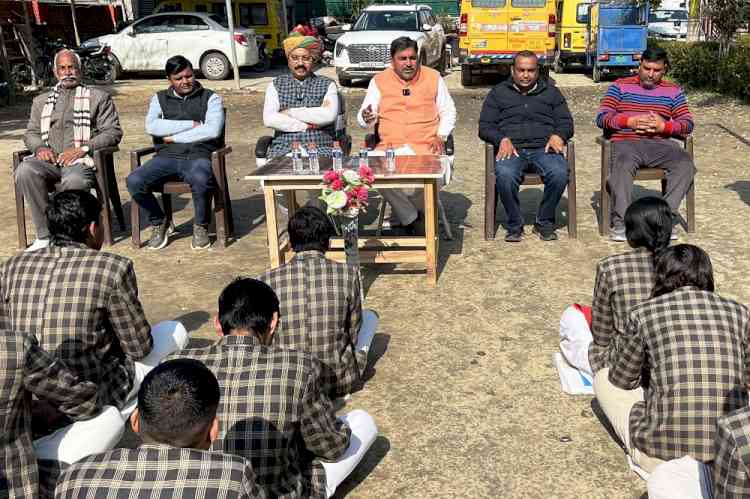Webinar on challenges in new VUCA world organized at Amity University
Speakers shared their views with the participants

Taking forward the series of industry interaction webinars, Amity International Business School and Amity Greater Noida Campus organized another session with three industry stalwarts on the topic Challenges in the new VUCA (Volatile, Uncertain, Complex, Ambiguous) world - Be prepared, to make best of Odds. Mr. Nitin Sonwalkar, Human Resource Specialist at SopraSteria (Pune), Ms. Shweta Srivastava, Head of Digital at Philips (Delhi) and Mr Saurabh Shah, Head-Human Resource at Capita (Pune) shared their views with the participants.
Prof. (Dr.) Gurinder Singh, Group Vice Chancellor, Amity Universities welcomed the speakers and said that in this present time it is very important to understand concept of VUCA.
Mr. Nitin Sonwalkar, Human Resource Specialist at SopraSteria (Pune) shared that VUCA was initially used in military parlance. “But an author Bob Johansen in his 2009 book ‘Leaders make Future’ extended the terminology of word VUCA for Businesses. He stated that Volatility stood for Intensity of Fluctuation (For example Share prices); Uncertainty –Unpredictability or surprise element (For example 9/11 attack); Complexity – Interdependent or connected factors and Ambiguity – Lack of information, clarity (for example entry into new markets),” shared Mr. Sonwalker.
Ms. Shweta Srivastava added that there were many disruptive events happened in recent history from where VUCA can easily understand. “Spread of Internet from 2000 onward; Arab Spring (Year 2011-12); the Y2K problem; financial crisis of 2008-09 and now the corona pandemic,” said Ms. Srivastava.
Mr. Saurabh Shah gave more insight into the VUCA framework and said that in a Volatile world, the changes are fast and furious which may or may not be predictable. “In an Uncertain World, it is hard to tell how things happened or developed. In a Complex Word, things are hard to untangle and understand. In an Ambiguous world, things are difficult to discern and decipher.
Mr. Nitin Sonwalkar deciphered how to manage VUCA and changed the abbreviations of VUCA into Vision – Paint a picture of the future you want; Understanding – Understand interconnections and make them transparent; Clarity – Simplicity by focusing on what counts & what it’s really about and Adaptability / Agility – Flexibility by scrutinizing hierarchical management techniques
Speakers also mentioned that managing in a VUCA World post COVID 19 will require amplified & collaborative leadership, new road map and preparation for a changed world.
In another webinar, Bollywood film director Shashank Khaitan spoke to students of Amity School of Film and Drama about the nuances of direction and acting. He shared with students how he had joined the institute wanting to be an actor but his interest started moving towards direction. “Acting taught me what a director wants from an artist. To write any story one has to constantly think like an artist to bring it to life. A stint in theatre post my studies helped me refine my skills,” shared Mr. Khaitan. He also shared how regional cinema was no less than bollywood and is a strong medium to depict Indian culture.
Another illuminating webinar was organized on ‘Role of Communications in crisis’ by Ms. Shaila Sam - United Nations Environment program Communication Consultant - UNEP-India office and Mr. Aman Dhall, Head of Communications, PolicyBazar.com. Ms. Sam shared how her stint with the Indian railways taught her a lot about crisis communication. Sharing with students about the types of crisis, Ms. Sam stated that it could be direct company or organization related, owing to misreporting in news or outside environment related collateral damage as being experienced by the country as of now. “While dealing with any crisis, one should maintain discretion; focus on manage perceptions and not manipulating; always look at the larger good; always keep the leadership briefed on the perceptions, keep them updated to answer queries while maintaining the truth,” shared Ms. Sam.
Mr. Dhall presented guideline for effective crisis communication. “Be open, accessible and willing to respond; be truthful; emphatic, compassionate and considerate; don’t over assure; acknowledge uncertainty; be regretful and not defensive; express wishes; acknowledge people’s fear and be willing to address ‘what if’ questions,” shared Mr. Dhall.


 cityairnews
cityairnews 










